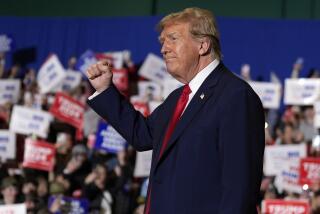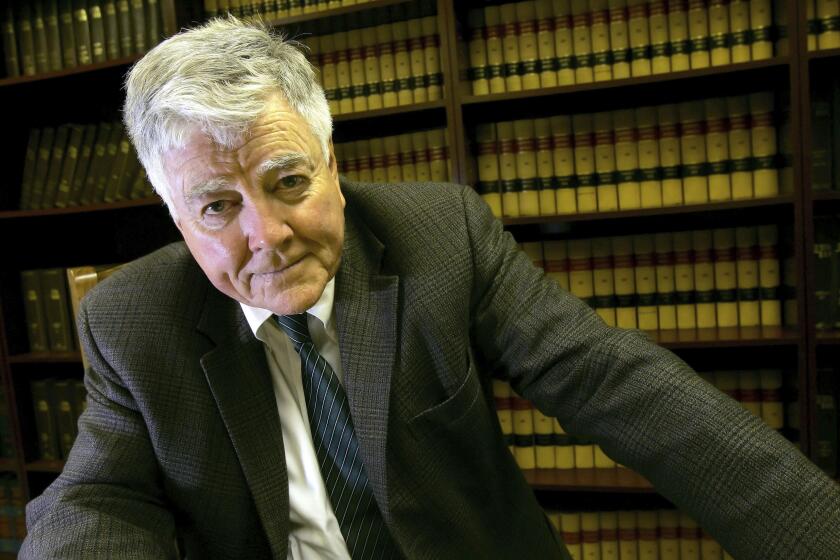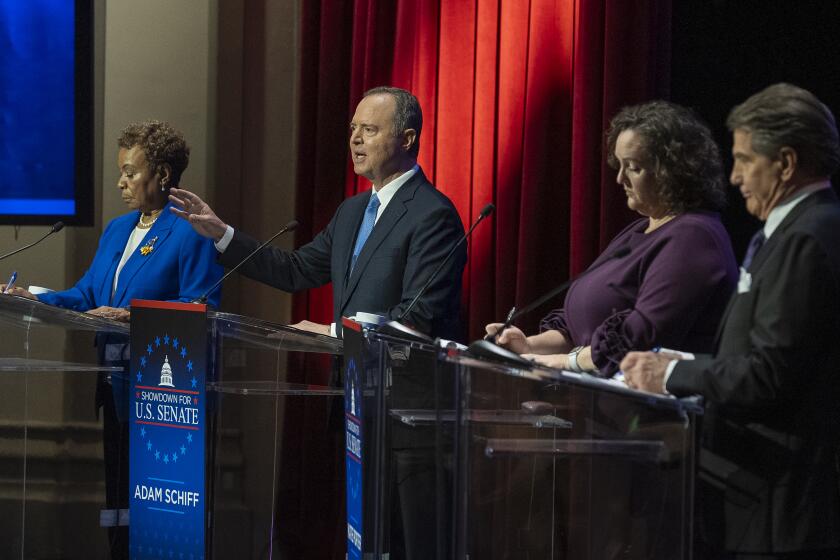Hiring Dip Makes Bush Campaign Job Harder
As he campaigns these days, President Bush asserts that the nation’s economy has “turned the corner.” But Friday’s disappointing employment report -- all but assuring that his record on election day will show a net loss of jobs during his time in office -- is likely to make Bush’s sales pitch all the more difficult.
The weak jobs numbers present a challenge to his claim that his “well-timed” tax cuts have fostered a steady recovery, several political analysts and economists said. Some economists had expected a gain of as many as 250,000 jobs for July, but the Labor Department said the economy created only 32,000.
While employers have added 1.2 million payroll jobs this year, they have shed a net 1.1 million jobs since Bush became president in January 2001.
The Bush campaign had been hoping that job growth would show clearer strength, said Alan Abramowitz, a political scientist at Atlanta’s Emory University, so that the president could “make a more credible case that things were getting better and that voters should give [the administration] more time for Bush’s policies to work.”
“But now it looks like it’s less likely the economy will be a plus for Bush going into the election.”
The payroll gain announced Friday “is a terrible number for Bush,” said Greg Valliere, chief strategist for Schwab Washington Research Group. He said that Sen. John F. Kerry of Massachusetts, Bush’s Democratic challenger, “can say the economy is sputtering, and I think he can say it with some justification.... It’s pretty tough to spin this number positively.”
The jobs report came in a week that also saw a rise in bloodshed in Iraq, another area where the tenor of news reports probably would affect Bush’s reelection chances.
Some analysts maintained that the economy was stronger than the jobs number indicated. Moreover, some saw good news for Bush in that Kerry had not positioned himself well in recent weeks, they said, to take political advantage of Bush’s possible weakness on the economy.
In his televised address at the Democratic National Convention last week, Kerry barely mentioned the jobs issue while focusing on national security and on convincing voters that he could serve as commander in chief.
Dean Baker, co-director of the Center for Economic and Policy Research, a liberal think tank, said that before Friday’s report, Democrats might have come to accept Republican assertions that the economy was adding jobs rapidly, and that the issue would not resonate with voters by November. He said that was probably a mistake on Kerry’s part.
“He’s been defensive on this,” Baker said. “It seems he’s given a lot away.”
Bush and Vice President Dick Cheney said the jobs report contained good news.
“Today’s employment report shows our economy is continuing to move forward,” Bush told supporters in New Hampshire. “And it reminds us that we’re in a changing economy and we’ve got more to do. I’m not going to be satisfied until everybody who wants to work can find a job.”
Cheney, speaking in Minnesota, listed what he said were administration accomplishments: 1.5 million jobs created since August; interest rates, inflation and mortgage rates at “historic lows,” rising home ownership and overall economic growth.
“I would have to conclude,” Cheney said, “and I think it’s a fair judgment, that the economy is back on track -- is headed in the right direction.”
Some economists supported that view. “What really matters at the ballot box is the actual reality of the economy,” said Brian Wesbury, chief economist at the Chicago investment banking firm of Griffin, Kubik, Stephens & Thompson. “It sure looks to me that the economy is doing much better than that headline number suggests.”
Kerry seized on the jobs report to poke fun at Bush’s theme of “turning the corner.”
“Well it must have been a U-turn, or else they’re continually turning and they’re going around in circles and ending up right back where they started from,” he said during a campaign stop near Kansas City, Mo. “The fact is, this is unacceptable in the United States.”
Impressions people draw now of the economy are important, some analysts said, because it takes time for news to resonate with voters. For instance, past improvements in the economy have not yet boosted the president’s poll ratings on his economic leadership.
A survey last month by Republican pollster Tony Fabrizio of likely voters in 19 battleground states found that nearly 3 in 4 respondents rated the economy as fair or poor. By a 3-1 ratio, the likely voters thought that jobs in their area were decreasing.
“If the pessimism still exists, that’s not very helpful to the president,” Fabrizio said.
The new jobs numbers may increase pessimism in the industrialized states of the Midwest that are considered a tossup in the election.
In Wisconsin, one of the electoral battlegrounds, pollster G. Donald Ferree said he thought the job figures would hurt Bush “at the margin” in a state he lost to Democrat Al Gore by fewer than 6,000 votes in the 2000 election. Ferree’s surveys have shown that Wisconsin residents give Bush lower marks for his economic policies than for his handling of other issues.
“My gut sense would be that it certainly doesn’t help him,” said Ferree, director of the University of Wisconsin’s Badger Poll, of the Friday jobs report.
The president could be hurt further by rising gas prices, which hit more people directly than the job numbers, and by the stock market, which plunged in response to the disappointing jobs report and high oil prices.
“The big three are the employment number, the price of gasoline and the stock market, and all three are breaking toward Kerry,” said Valliere.
July’s jobs report increased the probability that Bush would be the first post-Depression president to end his term with a net job loss, and made it virtually impossible for him to erase the remaining deficit by election day.
U.S. employers shed 2.6 million jobs between the time Bush took office and August 2003. Since then, 1.5 million jobs have been created, reducing the deficit during Bush’s term to 1.1 million and taking the sting out of Democratic charges that the president’s policies had spurred massive job losses.
But there will be only two more monthly job reports between now and the Nov. 2 election. Job growth would have to exceed 500,000 both times to close the gap by then, and analysts said that was beyond any reasonable estimate of the economy’s growth potential.
“You’d have to have firms running around going nuts hiring people,” said Baker.
Dave Winston, a GOP pollster, said that the candidates’ economic programs were more important than any individual job number. “This is not a partisan issue to most people,” he said. “In that context, what people are looking for is: Tell me your solutions and how you’re going to enhance job creation.”
Bush tells audiences repeatedly that his tax cuts are doing the trick, while he also calls for increasing job training programs to help workers who have been displaced. Kerry is promising tax credits for businesses that create new jobs, while saying he can reduce healthcare costs and give states money to stem rising tuition and local tax increases.
Still, in a campaign dominated by issues that remain in flux -- the economy, the war in Iraq and the fight against terrorism -- it remained unclear how much Bush would suffer and Kerry would gain by the job numbers.
More to Read
Get the L.A. Times Politics newsletter
Deeply reported insights into legislation, politics and policy from Sacramento, Washington and beyond. In your inbox three times per week.
You may occasionally receive promotional content from the Los Angeles Times.






